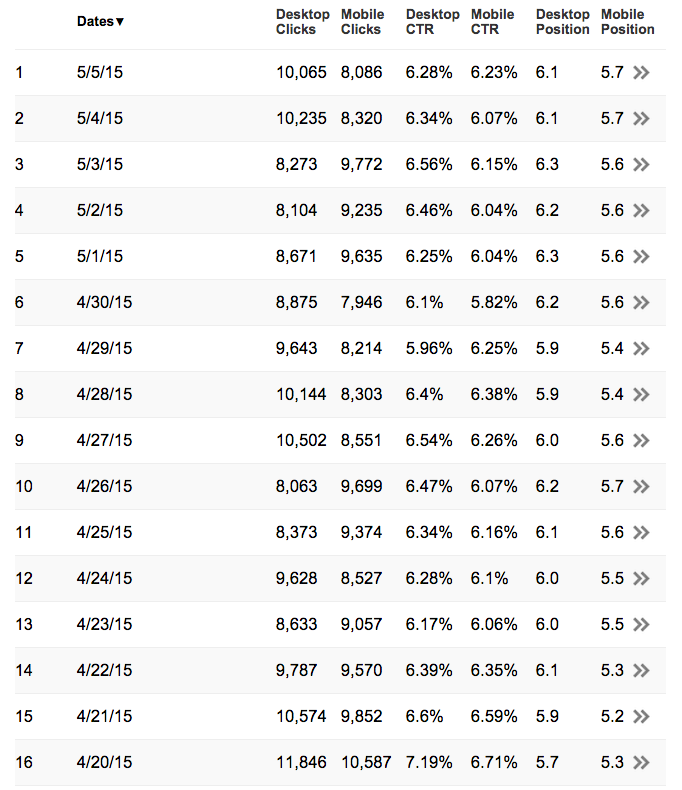The Mobilegeddon That Wasn’t. What Happened?
Despite the dramatic warnings, Google's mobile-friendly update turned out to be a non-event. Columnist Mark Munroe looks at what happened and how it might impact SEO into the future.

Google’s April 21 mobile-friendly update, generally referred to as “Mobilegeddon” was announced a few months ago. Fear and anxiety spread among the SEO community as we considered the possibilities of severe traffic drops and the associated fallout.
The mainstream media picked up on it. Much like a predicted “storm of the century” traveling up the East Coast of the U.S., the articles got more and more ominous as the day approached:
“Google Inc’s ‘Mobilegeddon’ Could Alienate Nearly Half Of Its Top Websites” – from Motley Fool.
“Google’s ‘Mobile-Friendly’ Update Could Impact Over 40% Of Fortune 500 Websites” – from TechCrunch.
Or how about “Are you ready for Googles Mobilegeddon Phonepocalypse .” – from Gizomodo.
Try saying “mobilegeddon phonepocalypse” three times fast!
Of course, the marketplace came to our rescue with mostly a repositioning of their products and services around mobilegeddon to allay our fears. I particularly enjoyed this one:
“Mobilegeddon: Is it time to buy your own server?” – from ITProPortal.
Oh yes, algorithm change — I better buy a new server!
The Traffic Impact
Now Mobilegeddon has come and gone with barely a whimper (at the time of this writing). I know there have been some third-party data applications that appear to have identified drops. However, I have direct access to several sites that are extremely mobile unfriendly to the point of being mobile-nasty! And yet … I can barely discern a difference.
See this average ranking report from Webmaster Tools:

As you can see, the average position for both Desktop and Mobile dropped 0.4 positions, so there’s been no significant change. In fact, I just returned from a mobile conference, and nobody at the gathering that I know of has detected any change (including several non-mobile friendly sites).
BrightEdge has published data that does show some change. However, that change is more significant as you go to page two and three of the SERPs (search engine results pages). BrightEdge doesn’t go into the same level of detail on page one, but I would bet there was very little shift in the top few positions. That would explain the almost nil impact on traffic.
So what happened? Why the disconnect between the dramatic warning and the actual outcome?
The Power Of Google
Google’s power over businesses small and large is incredible. That power is reflected in algorithm changes that can shift millions of dollars in business revenue.
This power was particularly evident with the Panda update back in 2011. The update changed the face of the Internet, essentially killing certain business models (think of content farms like eHow and shopping comparison engines).
Panda came without warning, and it was a desktopgeddon and mobilegeddon combined! Growing companies that were hiring people on Thursday were firing people on Monday.
I remember that day well. My CEO was walking into a board meeting to discuss our fantastic traffic growth while I looked at ugly traffic data and my stomach did a rumba. He walked out of the meeting with a huge smile on his face until he saw the sick look on mine and I said, “Something bad is going on.”
So it’s no surprise that the SEO community would react when Google says something like it did on February 26:
[blockquote]This change will affect mobile searches in all languages worldwide and will have a significant impact in our search results. Consequently, users will find it easier to get relevant, high quality search results that are optimized for their devices.[/blockquote]
When Google, the purveyor of Pandas and Penguins, talks about significant impact, of course we all jump. Is it any surprise the media and the SEO community reacted to this announcement the way they did?
Why The Disconnect?
So why did the company say “significant impact” when, in fact, there was little?
Google is well aware of the power it has to influence websites, and it seems lately it’s been taking advantage of that.
Last year, Google announced HTTPS (a protocol that’s more secure than the usual HTTP) would be a positive ranking factor. This led scores of sites to rapidly secure their sites. Yes, a good idea. Google wants a more secure Web.
Yet that update had a barely perceptible impact on rankings as well.
A better mobile Web is in Google’s best interest. It wants users on the mobile Web as opposed to moving over to apps. The more time users are in the app environment, the less they will be searching (and clicking on ads).
With the tremendous growth in apps, and particularly the increasing amount of time people are spending on them, Google must be concerned. In fact, the recent upgrade to Chrome supporting Web-based push notifications takes a big step in the direction of blurring the line between apps and the mobile Web.
The other unusual thing Google did with this update was announce a date six weeks in advance, creating a strong sense of urgency for sites to take action on their unfriendly mobile pages.
Could it be Google was simply using its power to push the Web in the direction it wanted it to go? OK, fine. But why overstate the impact of the algorithm? If Google has the algorithm “hammer,” it may very well fall on deaf ears the next time it tries to wield that hammer.
Never Mind?
Another possibility is that as the update approached, the algorithm tested poorly.
There is something fundamentally different about this update. In this case, Google would have been penalizing sites that users want to see in the results. This is quite different from Panda, which penalized poor quality, and Penguin, which penalized false reputations.
This penalty would have hit sites that deserve to rank normally but have some mobile issues. With so many of the Fortune 500 sites still not mobile-friendly, it would have been dinging sites that users want to see. So it’s possible that Google tuned down the algorithm to lessen its impact.
The MIA Matt Cutts Effect
Maybe it was simply miscommunicated. With Google’s Matt Cutts not around, it could be that there was no one who truly understands the SEO community in a position to explain the update.
If the BrightEdge data is accurate, it is true that there was a significant change in SERPs in that many searches now return different results than before. However, there wasn’t a significant business impact in that the changes had little effect on traffic, which, of course, is what’s significant to businesses and the SEO community!
What’s Next?
Inspiring mobile sites to improve and create a good user experience is ultimately a good thing for the sites and great for the Internet in general. The mobile Web is not going away, even with the growth of apps.
I do expect more mobile updates — and perhaps they’ll have a far more significant impact. Sites should continue to improve their mobile experience and provide a good experience for the user coming from search.
Still, I am really curious if Google is going to respond to what turned out to be a non-event.
How is the SEO community going to react when Google forecasts its next significant change? I spoke with several product managers who had to mediate update requests from frantic SEOs. In-house SEOs traditionally have a tough time getting attention and development resources. Unfortunately, this incident might make it even more difficult to get the support they need.
Contributing authors are invited to create content for MarTech and are chosen for their expertise and contribution to the martech community. Our contributors work under the oversight of the editorial staff and contributions are checked for quality and relevance to our readers. MarTech is owned by Semrush. Contributor was not asked to make any direct or indirect mentions of Semrush. The opinions they express are their own.
Related stories
New on MarTech